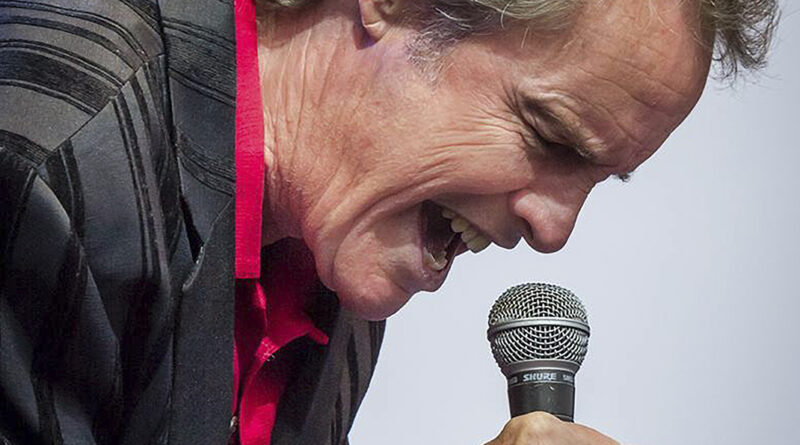Jumpin’ Joe
At 77, famed singer-saxophonist Joe Whiting releases book about storied career
By David Figura
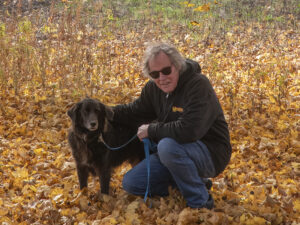
Singer-saxophonist Joe Whiting has been a notable part of the Central New York music scene and beyond for more than six decades.
Whiting, 77, of Skaneateles, recently released a memoir of his long and colorful career titled, “Saxophones, Microphones and Buried Bones.”
Whiting, known during much of his career as “Jumpin’ Joe,” came into prominence during the early 1970s as a member of the RCA Records signed band Jukin’ Bone. The band eventually broke up (he describes why in his book). Afterward, he played the rock & roll revival circuit with Bobby Comstock and at one point replaced Ronnie Dio as the singer in the band Elf.
His career also featured touring with Van Halen as the frontman of the Joe Whiting and the Bandit Band, which was the opening act at the concerts.
Throughout the years, his band has recorded several albums. His musical resume includes three years of touring the world as a member of Savoy Brown, a Grammy nomination, entry into the Syracuse Area Music Hall of Fame and numerous SAMMYS (Syracuse Area Music Awards) for Best Song Writer, Best Live Act and Best Rock Singer.
During his career, he was also in and out of a number of local bands and duo combinations, at times working with and composing songs with the likes of Mark Doyle and Loren Barrigar.
Whiting and his wife of 42 years, Diana, a retired hair dresser and an award-winning wildlife photographer, have a daughter, Heather, and one grandchild, Ella.
Today, Whiting continues to play out with his four-piece band (Brian Barrrigar on bass, Rick Basha on drums and Terry Quill on guitar), along with singing big band standards with the Mario DeSantis and Stan Colella orchestras and occasionally doing solo performances for special occasions and parties.
He’s proud of what he’s done in his career — and continues to do.
“I’ve just about done it all from house parties, concert halls, festivals to the bar around the corner and I still approach every performance with the enthusiasm that I had as a kid,” he said. “Heck, if I woke up tomorrow and couldn’t sing or play a note on my saxophone, I wouldn’t be pulling what’s left of my hair out. I’d give thanks for the ride. I’ve had a helluva good ride.”
The following are excerpts from a recent interview with Whiting about his life and new book.
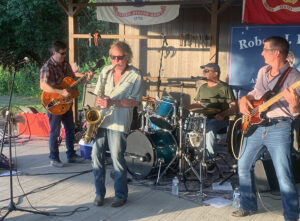
Question: Why did you write this book?
Joe Whiting: Over the years I’ve posted things on Facebook about local incidents, people passing, things like that. And a couple of years ago I did a post on Skan-Ellus [a popular eating place just east of the village of Skaneateles] and my unusual role in the establishment of that business. A female friend, Camille Cole, who is an editor and author herself, was my editor. It took about three years to complete and I self-published it.
Q: Considering your musical career and the people you rubbed elbows with, you steered clear of focusing on the sex, drugs and rock ‘n’ roll angle in this book. Why?
JW: That’s a big reason I decided to not pursue a publisher and to self-publish. If I was to go to a publisher, they probably would have all said the same thing. Essentially, that being in the music industry I’ve got to write a tell-all book, dropping a lot of names with juicy incidents. This book is not about me or others being screwed up, or such things as trysts with women before I was married. I wrote it from the standpoint of sharing stories about my life and career on my own terms.
Q: How did you get the nickname of Jumpin’ Joe?
JW: We had just wrapped up a project and I thought a nickname would be good for me. I just came up with it while I was driving in my car.
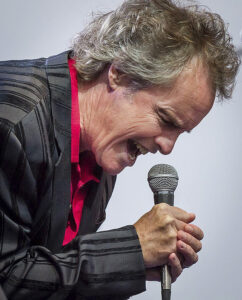
Q: Considering a career that spanned nearly six decades in the music business, it’s interesting you were never in your high school’s band or chorus.
JW: I struggled in high school. I used to be a pretty good student until eighth grade. And then ninth grade came along. I don’t know what happened. Maybe it was hormones, that I discovered music, girls. I don’t know. I really didn’t care for school that much. It took me an extra year to get my high school diploma.
Q: What made you embrace music as a life-long career?
JW: I’ve always been a radio person. In fact, when a high school guidance counselor asked me once about what I wanted to be, I said a disc jockey. And then I saw the Dean Brothers, a local family band, perform at a party and people were paying attention. Let’s face it. All adolescents want people to pay attention to them. For whatever reason, I felt everyone was paying attention to them and I like music. So I thought I could be a musician in the band and people would pay attention to me. So, I got started. The first band I was in, which included two of the Dean Brothers, was called The Ridgewoods.
Q: Who were your mentors; people who got you started or inspired you?
JW: I’ve been mentored by so many people. Not in a studying fashion, but by example. I mention many of them in my book.
Early on, though, there was Phil Klein, my eighth grade music teacher; Frank Agati, my saxophone teacher and in sixth grade my teacher, Bob Simmons. He had a piano in our room at school and sometimes he would get up there and play a little boogie woogie at the end of a class or something. I thought that was cool.
In my early days of playing in a band, I thought I knew everything. But when I started working with Bobby Comstock, I realized not only did I not know everything, but there was so much I had to learn.

Q: Being in the music scene, you could have lived most anywhere. Why did you remain in Skaneateles?
JW: I’m a small-town boy. Always have been. I’ve always been comfortable here. My father and his parents lived here practically all their lives. Diana and I have lived in the same house since 1979 and I’m sure we’re never going to move. And let’s face it, other than here, there’s no big demand for a 77-year-old singer-saxophone player.
Q: What role did your wife, Diana, play in your career?
JW: I met her at a job, a little club I was playing at. We’ve been married for 42 years, together for 51 years. She’s always been supportive of everything I’ve done. She’s not only a good sounding board; she’s a good grounding board. She’s a common- sense person, down to earth with a lot of empathy. She’s has helped me in so many ways to be a better person.
Q: What was your most memorable performance?
JW: Two come to mind. They weren’t before a big stadium crowd or a ground-breaking show. Both were private parties: one for a woman who was dying and one for a woman who had gone through a bunch of health issues and declared cancer-free.
Both were almost indescribable in regard to the love and depth of emotion that was in those rooms at that the time. I describe them both in the book.
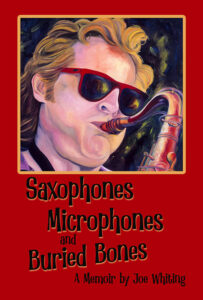
and Buried Bones.”
Q: Your greatest accomplishment as a musician?
JW: I’d say being durable, being adaptable and enjoying the ride. I’m not one of these guys with a one-year, or a five-year plan. I wake up in the morning and think, “Hey, what’s going on today?” I do think about the next day, but we’re not promised anything in life.
One of the knocks on me is that I’m all over the place. I love good pop music. I love rhythm and blues. Story songs, folk songs. I try to incorporate all that stuff in what I do.
Q: What’s your advice to a young, upcoming musician who wants to make music his or her career?
JW: The more you learn to sight- read music, that will help you in collaborating and communicating with other musicians. But most important, you have to love music and love it for the right reasons. Some people are just generated by “I want to be famous; I want to be rich.” For most people, that’s not going to happen. You should love what you do and think of ways to make a living out of it. It may be teaching music, working at a music store, making and selling instruments or just playing with friends. I’m not saying give up your dreams, but be realistic. The competition is incredible out there.
Q: You’re looking good at age 77. What’s your secret?
JW: I exercise every morning, mainly stretching. I get up and get on the floor for 20-25 minutes. And I walk our dog, Finn, religiously in rain, sleet or snow up at the town conservation area.
Q: Apart from music, I hear you’re into home brewing of beer.
JW: Yeah, I got heavy into it during the early 1980s. At one time, I seriously considered opening up a brew pub. But if you’re going to do that, it has to be your full-time profession. You can’t do it as a sideline. I’m a singer-sax player. Home-brewing is my creative hobby. It’s fun and I enjoy the benefits of it. When I brew, unless I’m making a cream ale or something [with corn or rice in it] my beer is usually just malt and water and yeast. I don’t like them super alcoholic. It’s usually about 5% alcohol and just a medium hop. I got a little brewery down in the basement, which includes a sink, a stove, a keg and four taps. Funny thing about it, nobody in my band other than me drinks. But a couple of people that I walk our dog with do. I give them beer all the time.
Q: How do you want to be remembered?
JW: Count Basie once said. “A good guy. That’s how I want to be remembered.” I feel that way. At the end of the day, it’s not how many songs you sang or gigs you played. What did you do? Were you a good person or a jackass? I’d like to be remembered as the former, not the latter.
For more about Joe Whiting or to buy his book, go to www.joewhitingmusic.com

